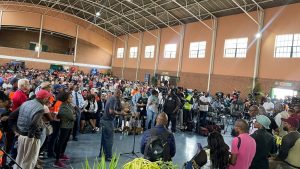A three-day 2018 African Capital Cities Sustainable Forum conference started in Pretoria on Tuesday. The conference, that has attracted local and continental administrators and local government representatives from more than 30 countries on the continent, was officially opened by Energy Minister, Jeff Radebe.
The minister’s keynote address “Responsible Leadership as Key to Sustainable Cities” reflected on the South African scenario and challenges after 1994 democratic elections.
In his address, Radebe urged the local and continental delegates – including public servants and administrators attending the conference – to work together in finding solutions to challenges faced by Africa.
He says rapid growth of slums coupled with poor revenue collection is a headache not only in South Africa but to many local governments and municipalities on the continent.
Radebe says after 24 years of democracy, the bad mark and legacy of rent boycotts used to fight the apartheid regime still haunts the democratic government.
“One of the weapons which were used to bring the city to its knees was a rents boycott. The question was what was the rationale for paying dues to an unrepresentative city? We were faced with a task after democracy of convincing our people that the time had come to end the rent boycott. It is true that many of the citizens cannot afford to pay for these services and the mechanisms have been developed to cater for them, but the legacy of rent boycott has continue to be a challenge for the democratic cities even today.”
Radebe urged governments on the continent to handle — with care — the concept of urbanisation and population explosion.
He says the ever increasing population and the growth of slums presents other socio-economic challenges for African countries — if urbanisation development is NOT properly managed. He says new global population statistic reveals that the current African population would have doubled in the next 30 years…
“More than 60% of urbanized Africans lives in slums with inadequate potable water, sanitation and other infrastructure. One shudders to think what would happen if there was to be an outbreak of waterborne diseases in these unplanned settlements. I do not doubt that all city administrators who are gathered here in this forum have to deal with the deluge of people who claims the city as theirs to occupy even when the city had not plan for them.”
DRC Ambassador to South Africa, who is also the Dean of African Diplomatic Corp, Bene M’poko says it’s about time that the people on the continent start working together to find everlasting solutions to socio-economic and political challenges facing the continent.
Mpoko also challenged forum organisers to invite women — who are a majority. He also called on the youth to participate in the forums in future.
M’poko says, “When you have a youth population means you have a good future because they bare the future. So we are hoping that next time we meet the entire continent all the major or the capital cities of Africa would be present. Because the issue we are facing on the continent are very challenging; But we can tackle them head on if we work together. We had to forge our way forward together. We need the participation of everybody including the women. We can no longer afford to ignore 51% of our population.”
Tshwane Executive Mayor, Solly Msimanga explains the objective and benefits of hosting the annual events.
“Today presents the fourth installment of the African Capital Cities Sustainability Forum. The continental platform that provides us all with a shared interest on opportunity of shared interest in a prosperous sustainable and resilient continent – the space of grappling with our common challenges band possibly most importantly to recognise our common opportunities.
“We are here today to share each other experience and successes, to stand on each others shoulders and ultimately to achieve the joint objective of bolstering the resilience of our urban communities and to develop our local economies as we transition to a cleaner, better, more people’s centric low carbon cities that we are all passionate about.”
The forum is expected to wrap up its business on Thursday.






